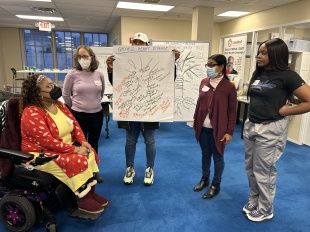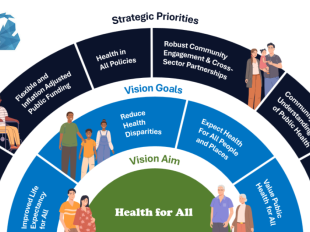Add civic health to your August check-ups
August marks a time of back-to-school physicals and annual check-ups to monitor physical and mental health. But what about your community’s civic health? Are you engaged in your community? How do policies help or hinder your ability to vote? Volunteer? Participate in budget decisions?
Organizations across the country are making connections between health and people’s ability to participate in community decisions as a part of Civic Health Month. Civic health is shaped by a community’s infrastructure in the form of libraries, community centers, high-speed internet and local news — and whether that supports residents’ ability to connect and participate.
Civic health focuses on the well-being of neighborhoods, communities, states and the nation and welcomes everyone’s participation in setting priorities, making decisions and sharing resources. Civic health can have a profound impact on health and well-being. People tend to be healthier and have higher rates of participation with more available and better-resourced civic infrastructure.
Action is necessary to improve civic health and make it easier to participate in civic life. Effective strategies CHR&R has researched include:
- Voter turnout initiatives that make voting easier, more convenient and more accessible. They include get-out-the-vote campaigns such as door-to-door canvassing, and mailed reminders, early in-person voting and vote-by-mail programs; and
- Broadband initiatives for unserved and underserved areas that increase access to information and digital civic life (online meetings, online government documents, etc.).
Other strategies strengthen local ownership and community assets by investing in public spaces, nurturing civic skills and improving opportunities to work toward a common purpose, including:
- Public libraries that offer computers with high-speed internet, spaces for gathering, classes in financial literacy and other enrichment opportunities;
- Youth civics education to teach students the attitudes, skills, knowledge and behavior needed to participate and contribute to democracy; and
- Public deliberations that bring people of all backgrounds, values and perspectives together to engage in a topic of public concern. Participants are provided with balanced information and a facilitated dialogue.
Learn more about the strategies that can strengthen civic health in our curated list and explore the ways it contributes to thriving communities in our 2024 National Finding Report. And join our September 17th webinar on using storytelling as a tool to increase civic participation: https://www.countyhealthrankings.org/findings-and-insights/webinars/storytelling-as-a-tool-to-increase-voter-participation



